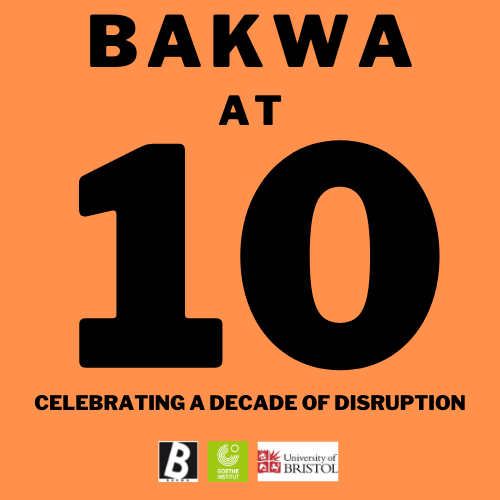December 2021 will mark Bakwa Magazine’s tenth anniversary. From inception in 2011 to currently being at the forefront of African literary culture, our journey is a remarkable one.
Created as a response to the dearth of critical and creative writing in English in Cameroon—which dearth turned into gaping void with the discontinuation of similar, preceding initiatives—Bakwa Magazine was an impetuous project. There was no long-term thought, other than the need for the magazine to exist, to fill the void, to provide a platform where writing and literary criticism from Cameroon or by Cameroonians, as well as original and experimental writing, irrespective of country of origin, could exist and thrive.
This impetuousness found further validation as early as Bakwa 02: Conversations (2012), where Joyce Ashuntantang, in an interview by Dibussi Tande, emphasised the importance of owning our narratives. She posited that: “As long as foreign publishers remain the midwives of our stories, they will keep determining the nature of these stories.” Coming at a pivotal moment for the magazine—when we were rethinking our direction—the relevance of this statement could not (and still cannot) be overlooked when the “legitimisation” of African literary output was and is still usually dictated in New York, London, or Paris.
In her keynote speech at the third Abantu Book Festival in Soweto, South Africa, Bibi Bakare-Yusuf, co-founder and publishing director of Cassava Republic Press, brilliantly sums up the relationship between telling our stories and owning the means of production in the following terms: “It is not enough for us to say we must tell our own stories, if we don’t equally think or talk about the enabling infrastructure that supports the generation of those stories, the infrastructure that enables the circulation of ideas and the flow of knowledge.”
It therefore comes as no surprise that Bakwa’s growth has been underpinned by the quest to contribute to the emergence of an enabling infrastructure in our context. This quest has birthed several projects and initiatives such as:
- the Bakwa Magazine Reading Series, a public event that brings together a wide selection of writers, translators, editors and poets, and connects them to various local communities by hosting events in different cities;
- BakwaCast, a periodic, conversational, intimate and introspective living archive that includes episodes of the Bakwa Magazine Reading Series and looks at interesting people—from artists, curators, writers, techies, performers, to policy makers—and what makes them tick.
In the same vein, the success of the magazine, as well as the lack of adequate publishing structures, led to the creation in 2018 of Bakwa Books, an independent publishing house, which champions fiction, creative nonfiction and translation. By foregrounding translation as a crucial part of our vision, we further interrogate hierarchies of language—through translations or the lack thereof—in our projects and engage in remapping literary translation practice by prioritising African audiences as part of efforts towards reclaiming our own stories. Bakwa Books, thus, is a continuation of Bakwa Magazine’s mission, going beyond the latter by thinking radically about the whole production process and the possibilities of approaching publishing ethically, while still being able to circumvent monolithic models by exploring alternative models of distribution.
With the foregoing, it is obvious that we’ve always been fascinated with ways of leveraging the opportunities afforded by technological advancements to curate and publish stories across multiple platforms. This, perhaps, explains the fluidity that characterises projects by Bakwa, from the written word online to podcasts and print. Ultimately, these projects and initiatives are a testament to our ever-evolving vision and approach, which has enabled us to move from filling the lacuna to engaging and shaping publics and networks of practice, as well as interrogating hierarchies of language through curated conceptual and collaborative projects.
Over the years, Bakwa has thus consistently published cutting-edge literary works from talented, innovative writers from Africa, the black diaspora, and elsewhere. In this regard, Bakwa Magazine’s backlist thus boasts over 150 writers (including Imbolo Mbue, Yewande Omotoso, Florian Ngimbis, Yovanka Paquete Perdigao, Kalaf Epalanga, Dami Ajayi, Howard M-B Maximus, Pwaangulongii Dauod, Lebohang Mojapelo, Margarita Ríos-Farjat, Syl Cheney-Coker, Minna Salami, Bertille Mbarga, Nkiacha Atemnkeng, Mignotte Mekuria, Ucheoma Unwutuebe and TJ Benson). A number of the young writers published early by Bakwa have gone on to win significant prizes: Abiola Oni won the Guardian and 4th Estate BAME Short Story prize in 2016; Bengono Esola Edouard (winner of the Bakwa Magazine Short Story Prize) won the Concours littéraire nationale jeunes auteurs 2017; Socrates Mbamalu was awarded the Saraba nonfiction manuscript prize and longlisted for the Writivism Nonfiction Prize; Munachim Amah won the Writivism Short Story 2017 Prize; Nkiacha Atemnkeng (runner-up for the Bakwa Magazine Short Story Prize) was longlisted for the Short Story Day Africa Prize 2019; and Howard Meh-Buh Maximus won the Morland Writing Scholarship in 2020. These writers, both emerging and established, have been part of our journey from online to print—spanning ten issues—and our growth from a small digital literary mag to a print publication that is read around the world and has metamorphosed into a multimedia publishing structure, on the verge of launching its first imprint, Kuumba Books.
It’s been 10 years of a labour of love that has been as exciting and exhilarating as it has been challenging. There is an almost inexhaustible list of people without whom none of this would have been possible. However, we owe special thanks to: Kangsen Feka Wakai, Dibussi Tande, Nfor E. Njinyoh, Serubiri Moses, Harry Kale, Babila Mutia, Jack Little, David Shook, Madhu Krishnan, Ruth Bush, Georgina Collins, Ros Schwartz, Billy Kahora, Edwige Dro, Socrates Mbamalu, and Ntone Edjabe.
To celebrate this decade of disruption, we are hosting events, podcasts and readings in Yaounde, London, and Berlin. Additionally, consolidated and recomposed back issues (issues 1-8) of Bakwa Magazine will be available for free, and issues 9-10 for sale in physical and eBook (stockists here) format. Finally, we will highlight selected pieces from each issue and reflect on the decade online and offline as well as organise social media giveaways.
The Bakwa Team
